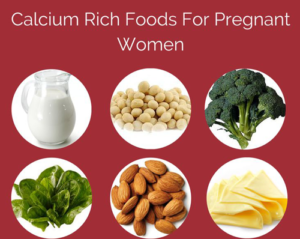Calcium is a crucial mineral for building and maintaining strong bones and teeth. It plays a vital role in many bodily functions, including muscle function, nerve transmission, and blood clotting. According to the World Health Organization (WHO), 99% of the body’s calcium is stored in the bones and teeth, while the remaining 1% is found in the blood, muscle, and extracellular fluids. For pregnant women, adequate calcium intake is essential to support the developing fetus and prevent complications. Let’s explore the best calcium-rich foods to protect your newborn baby’s health and ensure a strong start in life.

Why Calcium Matters for Newborns
While a tiny human may seem all soft and cuddly, their bodies are busy building a strong foundation for a lifetime of movement and exploration. Around 99% of a baby’s bones and teeth are composed of calcium [1]. This mineral also supports muscle function, nerve transmission, and blood clotting [2].
Here’s a breakdown of how calcium benefits your newborn:
- Strong Bones and Teeth: Calcium serves as the building block for a sturdy skeletal system. Adequate calcium intake during pregnancy helps ensure your baby develops strong bones from the get-go, setting them up for a lifetime of good bone health.
- Muscle Function: Calcium plays a vital role in muscle contraction and relaxation, influencing your baby’s early movements and reflexes.
- Healthy Nervous System: Calcium is essential for proper nerve transmission, which impacts everything from reflexes and coordination to sensory development.
- Blood Clotting: Calcium is involved in the blood clotting process, helping to prevent excessive bleeding after birth.
How Much Calcium Does a Pregnant Woman Need
The National Academies of Sciences, Engineering, and Medicine recommends that pregnant women aged 19-50 consume 1,000 milligrams (mg) of calcium daily [3]. This amount ensures you have enough calcium for your own needs and to support your baby’s development.
Here’s a quick guide to calcium needs during pregnancy:
- Trimester 1: While the calcium requirement doesn’t significantly increase in the first trimester, focusing on a balanced diet rich in calcium-containing foods is still important.
- Trimester 2 & 3: This is when your baby’s bones and teeth are rapidly developing. Aim to consume around 1,000 mg of calcium daily to meet both your and your baby’s needs.
Can a Newborn Get Enough Calcium if Mom Doesn’t Consume Enough
If a pregnant woman doesn’t consume enough calcium, her body will pull calcium from her own bones to meet the baby’s needs [4]. This can lead to weakened bones and an increased risk of osteoporosis later in life for the mother.
The good news is that by incorporating a variety of calcium-rich foods into your diet, you can ensure both you and your baby are getting the calcium you need for optimal health.
Top Calcium-Rich Foods for Pregnant Women: A Delicious Journey
Now that you understand the importance of calcium for your newborn, let’s explore some delicious and nutritious options to add to your pregnancy diet:
Dairy Products (with a focus on moderation):
- Milk: Cow’s milk is a classic source of calcium, with one cup (240ml) providing about 300mg of calcium. Opt for whole milk during pregnancy for added calories and fat to support your growing baby.
- Yogurt: A delightful source of calcium and probiotics, yogurt is a great snack option. Choose plain yogurt and add your own fruit for a touch of sweetness. One cup (240ml) of plain yogurt provides around 415mg of calcium.
- Cheese: Hard cheeses like cheddar and Parmesan are packed with calcium, with one ounce offering about 300mg. However, be mindful of portion sizes and choose pasteurized cheese options to avoid potential Listeria risks.
Beyond Dairy: Exploring Plant-Based Calcium Sources
If you’re lactose intolerant or following a vegan diet, fret not! There are plenty of plant-based options rich in calcium to consider:
- Leafy Green Vegetables: Dark leafy greens like kale, collard greens, and turnip greens are champions of calcium. One cup of cooked kale provides around 180mg of calcium [8].
- Tofu and Tempeh: These soy-based protein sources are excellent alternatives to meat and offer a good amount of calcium. Half a cup of firm tofu contains around 431mg of calcium [9].
- Fortified Plant-Based Milks: Many plant-based milk alternatives like almond milk, soy milk, and oat milk are fortified with calcium. Be sure to check the label and choose brands with at least 30% of your daily calcium needs per serving.
- Beans and Lentils: These dietary staples are packed with protein, fiber, and a decent amount of calcium. One cup of cooked chickpeas provides around 250mg of calcium [10].
- Seeds: Sesame seeds, chia seeds, and flaxseeds are tiny powerhouses of calcium. A quarter cup of sesame seeds offers about 88mg of calcium [11]. Sprinkle them on salads, yogurt, or oatmeal for a calcium and nutrient boost.
- Dried Fruits: Figs, prunes, and raisins are delicious sources of calcium and fiber. One cup of dried figs packs around 241mg of calcium [12]. Enjoy them on their own or incorporate them into trail mix for a healthy and satisfying snack.
- Salmon and Sardines: Enjoy the benefits of seafood with calcium-rich options like salmon and sardines. Three ounces of canned sardines with bones provides a whopping 351mg of calcium [13]. Opt for canned varieties packed in water for a lower sodium content.
Tips for Maximizing Calcium Absorption
While incorporating these calcium-rich foods is essential, it’s also important to maximize your body’s ability to absorb calcium. Here are some tips:
- Vitamin D is Your Partner: Vitamin D plays a crucial role in calcium absorption. Include Vitamin D-rich foods like fatty fish or consider taking a prenatal vitamin with Vitamin D to ensure optimal absorption.
- Limit Sodium Intake: High sodium intake can hinder calcium absorption. Be mindful of processed foods and added salt when preparing meals.
- Space Out Your Calcium Intake: Spreading out your calcium intake throughout the day rather than consuming large amounts at once can improve absorption.
- Go Easy on the Caffeine: While moderate coffee or tea intake is generally safe during pregnancy, excessive caffeine consumption can interfere with calcium absorption.
Beyond the Basics: Unique Perspectives on Calcium for Moms-to-Be
- Building a Strong Foundation for the Future: Adequate calcium intake during pregnancy not only benefits your newborn’s immediate bone development but may also have long-term implications. Studies suggest that sufficient calcium intake during pregnancy can reduce the risk of your child developing osteoporosis later in life [14].
- Taste of Tradition, Boost of Calcium: Explore cuisines from around the world that incorporate naturally calcium-rich ingredients. Look for recipes featuring ingredients like sesame seeds (common in Asian cuisine), black-eyed peas (a staple in Southern US cooking), or calcium-fortified tortillas (a base for many Mexican dishes).
- Getting Creative in the Kitchen: Disguise those healthy calcium sources! Sneak in spinach or kale into smoothies or add mashed tofu to your favorite pasta sauce. There are endless ways to incorporate these nutritious ingredients into your diet without sacrificing taste.
Conclusion: Building Strong Bones Together, One Bite at a Time
By incorporating a variety of calcium-rich foods into your pregnancy diet, you’re not just nourishing yourself, you’re building a strong foundation for your newborn’s health and development. Remember, consistency is key! Aim to include calcium-rich options throughout your pregnancy journey. Don’t hesitate to discuss your calcium needs with your healthcare provider for personalized guidance. With a little planning and creativity, you can ensure both you and your baby get the calcium you need for a healthy and happy pregnancy.
